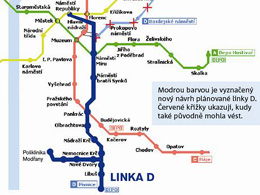
The Prague council rejected the joint venture of DPP and Penta for metro line D
 |
According to Penta's spokesperson Ivo Mravínac, prejudices and pre-election battles prevailed over the possibility of significantly accelerating construction. "Metro D could be operating within seven years and would significantly save public finances," he told ČTK.
According to information from ČTK, out of the 11 council members, three representatives from ANO and two from ČSSD voted for the proposal. The Deputy Mayor for Transport Petr Dolínek (ČSSD) wanted to submit the proposal to the council in mid-July, but ultimately withdrew it. He did not want to comment on today's rejection of the plan.
"The Troika Coalition has been long highlighting the shortcomings of this project. I consider the fact that it was not approved by the council today as a victory for common sense," stated the Deputy Mayor for Urban Development Petra Kolínská (Greens/Troika Coalition). She added that the joint venture is no longer necessary because the recently approved amendment to the law will allow for faster expropriation of land.
DPP had a legal analysis prepared which stated that while the amendment would likely speed up the expropriation process, acquiring all the land would still take several years. The analysis evaluated the joint venture between DPP and Penta as the fastest, most flexible, and most efficient option, which is also not tied to the rules of the expropriation proceedings.
According to the plan, Penta, which succeeded in the tender, was to hold a majority stake of 51 percent in the company. This would allow it to pay higher than the estimated prices for the land, which public entities cannot do. The joint venture was also supposed to benefit from the financial appreciation of lands adjacent to the new stations, thus covering part of the construction costs. The plan did not concern the construction of the metro itself, only the stations. Critics argued that the proposed arrangement was not sufficiently transparent and did not guarantee that Prague would not incur losses from the venture. DPP rejected this.
Metro D is intended to relieve route C and connect residential areas in the south of Prague with the center. The first phase of construction will create the section from Pankrác to Olbrachtova. Subsequently, the construction will be extended to the planned stop at Nové Dvory and then to the terminal at Depo Písnice. In addition to the section from Pankrác to Písnice, Metro D will also run from Pankrác to náměstí Míru. The new line will have driverless trains. The first exploratory works are set to begin by the end of this year.
The English translation is powered by AI tool. Switch to Czech to view the original text source.
0 comments
add comment
Related articles
0
06.06.2022 | Prague will be able to take a loan from the European Investment Bank for the construction of metro line D
0
16.03.2022 | Hřib calls for measures against the oligarch who would gain part of the revenues from the construction of the metro
0
21.03.2019 | The estimated cost of metro line D is 72 billion, while it has currently cost 1 billion.
0
15.03.2019 | The leadership of Prague will discuss an agreement with landowners for metro D
0
22.01.2019 | Construction permit for the first section of metro line D is expected to be issued within three years
0
25.05.2018 | DPP and Penta will establish a company for the purchase of land for the construction of metro line D
0
08.02.2018 | The partner of DPP for the construction of metro line D is to be Penta, the commission has decided








